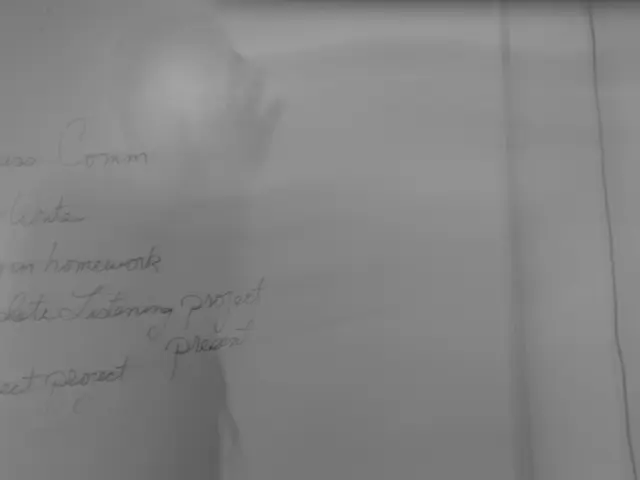Businessman emulates Police Squad! antagonist: A company director's creative retaliation against an inept con artist
Heythere! Let's talk about some shady business that's going around in the financial world. Just a few days back, a financial advisor in London had his name and company used by scammers to swindle one of his clients. The client, thank goodness, was smart enough not to fall for it.
The scam started with an email pretending to be from Jim Harrison, a director of Master Adviser, a firm that specializes in income-friendly portfolios for retirees. The email invited the client to invest in a Banking Circle cash management portfolio, offering an 8.52% income fixed for 12 months on an investment of £200,000. This sounded like a sweet deal, but it was all fake.
For those who don't know about Banking Circle, it's a Luxembourg-based company with UK operations regulated by the Financial Conduct Authority (FCA). However, the email was sent from a cloned email account, not the real one. The scammers had even mentioned their long-term relationship with Banking Circle in the email, which was a red flag.
The email assured the client that his money would be protected by the Financial Services Compensation Scheme (FSCS) in the event of Banking Circle going bankrupt. It sounded official, but it was a lie. The real Jim, when contacted by the client, confirmed that the email was a scam.
The email seemed legitimate, but the only giveaways were the opening line, which was overly friendly, and the sender's email domain. The real Master Adviser's domain is masteradviser.co.uk, while the scam email was sent from masteradvisers.co.uk.
Annoyed by the attempted fraud using his name, Jim decided to take matters into his own hands. He set up a dummy email account in the name of Dutch Gundersen, a character from the 1980s American comedy series Police Squad!. He emailed his clone for details about the portfolio service.
It wasn't Jim who responded, but Luke Morley, who sent the same product details as the fake Jim had given the client of the real Jim. Luke said Jim was away on holiday. Dutch responded by saying he didn't have £200,000 but would be happy to invest about half of that amount. Luke said that would be fine, saying: "Let me know what you think and if I should go ahead and set up an account for you."
Dutch requested the necessary forms and said he would be able to call in at Master Adviser's address in London if needed. Luke replied by saying that he would set up the investment portfolio and send the confirmation documents. Luke then called Dutch and asked whether he had received the documents. Dutch gave him the password for the confirmation notice, and Luke asked him to send the money to Alpha Trading's account with Banking Circle.
The following conversation between them was entertaining, with Dutch asking awkward questions that the fraudster avoided answering. Luke was not phoning from overseas, but he was based in the UK, pretending to be based remotely.
This shows that criminals will go to great lengths to persuade us to part with our hard-earned money. It's important to always be cautious and to verify the authenticity of any emails or requests before taking any action. If you see any shady activities like this, don't hesitate to report them to the FCA or Banking Circle. Stay safe out there!
Related Articles- Previous- 1- Next- How This is Money Can Help
More This is Money Articles
Enrichment Data
Identification Methods
- Check email authenticity
Verify sender addresses for slight misspellings (e.g., "bankingcircle.com" vs. "bankingcircle.co"). Clone scams replicate legitimate emails but often use suspicious domains.[2][3] - Inspect links and attachments
Hover over hyperlinks to check for mismatched URLs. Cloned emails often direct to non-secure or spoofed sites (e.g., http:// instead of https://)[3] Attachments may contain malware disguised as documents. - Look for urgency tactics
Phrases like "Immediate action required" or "Account suspension" are red flags. Scammers pressure victims into bypassing standard verification.[3][5] - Cross-verify contact details
Compare phone numbers/email addresses in the email with those listed on the FCA Register or the firm's official website. Clone firms often spoof legitimate credentials.[5] - Watch for verification loopholes
Scammers may provide accurate personal details stolen from breaches to appear legitimate, as seen in deepfake-driven account takeovers.[4]
Reporting Procedures
- FCA channels:
- Use the FCA ScamSmart reporting tool or call 0800 111 6768.
- FCA-regulated firms must report suspected cloning to the FCA via their dedicated portal.[5]
- Banking Circle:
Forward suspicious emails to the bank’s verified fraud department (contact details from their official website, not the email itself). - National Cyber Security Centre (NCSC):
Report phishing emails to [email protected][3]
Key Verification Tools
| Tool | Purpose | Link ||------|---------|------|| FCA Register | Confirm advisor/firm authorization | register.fca.org.uk || FCA Warning List | Check unregulated/clone firms | FCA ScamSmart || WHOIS Lookup | Investigate suspicious domains | whois.icann.org |
Pro Tip: Enable multi-factor authentication (MFA) for all financial accounts, as cloned emails often aim to bypass this layer[3][4].
- In the criminal underworld of finance, mortgages and banking, fraudsters often employ shady tactics to swindle unsuspecting individuals.
- As demonstrated recently, these criminals may clone email accounts of financial advisors to promote fake investment opportunities, like the Banking Circle cash management portfolio.
- To protect your savings, always verify the authenticity of emails, especially by checking the sender's domain, watching for urgency tactics, and cross-verifying contact details against the FCA Register.
- For added security, enable multi-factor authentication (MFA) for all financial accounts to thwart fraudsters' attempts.
- Remember, Vitamin C may help boost your immune system, but staying vigilant in financial matters is equally important to safeguard your business and general-news portfolio.
- Whenever you stumble upon crime-and-justice activities like these, don't hesitate to report them to the FCA, Banking Circle, or National Cyber Security Centre (NCSC) to help others avoid falling victim to such scams.




